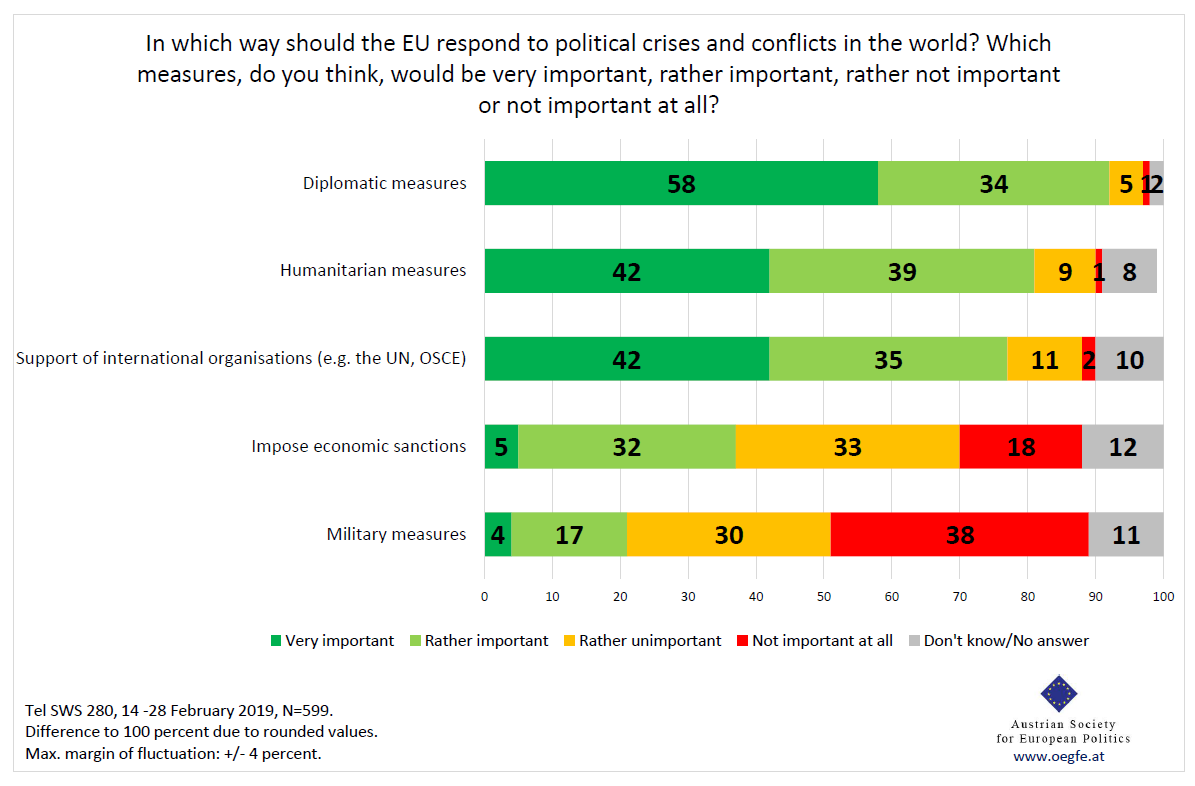Reflections to establish a common European army meet with a mixed response in Austria. For many, this is currently not an issue. Desire to participate in a future EU army is low. Austrians want the EU to focus on diplomatic and humanitarian means to react to crisis and conflicts in the world. Neutrality still is a main pillar shaping Austria’s identity. These are the findings of a recent survey by the Austrian Society for European Politics (ÖGfE), which was conducted throughout Austria in February 2019.
Austrians are divided on the question if EU member states should increase efforts to establish a common European army: 36 percent would support such plans, 38 percent oppose them. A quarter of respondents (26 percent) could not make up their mind yet.
45 percent are against Austria’s participation in a common European army, 35 percent would like our country to be part of it. One in five respondents did not answer to this question.
Austrians believe that the European Union should focus primarily on “diplomatic measures” to respond to political crises and conflicts in the world. Nine out of ten respondents (92 percent) consider this to be “very important” (58 percent) or “rather important” (34 percent). For only 6 percent, diplomacy is “rather unimportant” (5 percent) or “not at all important” (1 percent) in this regard. (Rest = “do not know / no answer” – also applies to the following topics). Eight out of ten Austrians support “humanitarian measures” of the EU to counter conflicts and crises (42% “very important” / 39% “rather important”), one in ten respondents say that these are less (9%) or totally unimportant “(1 percent). To a similar extent, the “support of international organisations such as the UN or the OSCE” is considered important (42% “very” / 35% “rather”). 13 percent do not agree (11 percent “rather unimportant” / 2 percent “not important at all”).
On the other hand, there is some skepticism to “impose economic sanctions” to respond to conflicts and crises in the world. A total of 51 percent consider this “rather unimportant” (33 percent) or “not at all important” (18 percent). Just over one third (37 percent) think that economic sanctions should be a “very” (5 percent) or “rather important” (32 percent) element of the EU in foreign politics. The “use of military measures” comes last. Just one in five respondents thinks that the EU should refer to them (4 percent “very important” | 17 percent “rather important”). However, more than two-thirds do not want the EU to take military measures to react to conflicts and crisis in the world (30 percent “rather unimportant” / 38 percent “not important at all”). Eight out of ten respondents state that Austrian neutrality is “very important” (56 percent) or “rather important” (24 percent) for them. The number of those who attribute less importance to neutrality is low (11 percent: “rather unimportant” / 4 percent “not at all important”).
The current survey was conducted from 14 to 28 February 2019 by the Sozialwissenschaftliche Studiengesellschaft (SWS) on behalf of ÖGfE (Tel SWS 280). 599 persons were questioned via telephone (Austrian population from the age of 16 / weighted according to gender, age and education). Maximum margin of fluctuation approx. +/- 4,0 percent. Difference to 100 percent due to rounded values.






